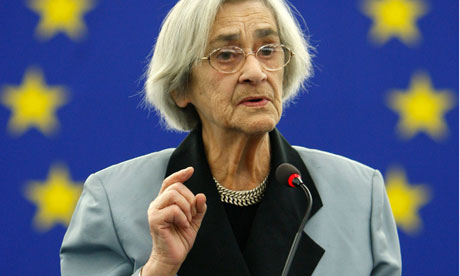Yelena G. Bonner, the Russian human rights activist who was the widow of Nobel Peace Prize laureate Andrei D. Sakharov and came under repression by the secret police, died of heart failure in Boston on Saturday, according to the Associated Press.
Mrs. Bonner, decorated for valor and wounds during World War II, was 88. She had been hospitalized since Feb. 21, her daughter Tatiana Yankelevich told the AP.
Mrs. Bonner was a founder of one of the most active rights groups in the Soviet dissident movement of the 1970s, the Helsinki Monitoring Committee. The organization, which for a time disbanded in 1982 after most of its members were jailed for political crimes against the state, sought to publicize Soviet violations of human rights guarantees made when Moscow signed the 1975 Helsinki Agreement on European Cooperation and Security.
The Helsinki Act recognized Soviet hegemony in Eastern Europe in return for Soviet assurance to nurture fundamental freedoms, such as free speech, assembly and religion.
The Helsinki Act caused numerous unofficial rights groups to form, and they became an unusual phenomenon in the life of the Soviet capital in the mid-1970s. There were groups delving into invalids' rights, religious oppression, political abuse of psychiatry, workers' rights and emigration demands.
Mrs. Bonner signed hundreds of zayevlenie, or statements, supporting victims of KGB reprisals. She and her husband traveled through Siberia and remote parts of Russia, visiting courtrooms and jails to aid imprisoned activists.
By the decade's end, however, many activists were in prison or labor camps. The luckier were expelled from Russia or sent into internal exile far from Moscow. Mr. Sakharov was arrested in January 1980, and was confined to Gorky, 250 miles east of Moscow. Mrs. Bonner had a special status as wife of Mr. Sakharov, the father of the Soviet hydrogen bomb. She was allowed to travel to Moscow until May 1984, when the KGB detained her in Gorky on allegations she had committed anti-state crimes.
During a period of reform under Mikhail Gorbachev, the couple was allowed to return to Moscow in 1986, where they pressed on with their calls for greater freedom and revived the monitoring committee.
Mrs. Bonner’s activism entered a new phase after Mr. Sakharov died in 1989 and the Soviet Union collapsed two years later.
She went on to promote human rights in the post-Soviet era by challenging President Boris Yeltsin’s and President Vladimir Putin’s government.
When a petition circulated in 2010 calling for Putin to step down, Mrs. Bonner was among the first to sign it.
Mrs. Bonner was physically striking, with a robust frame, a no-nonsense voice deepened by years of chain-smoking acrid Russian cigarettes. She frequently wore heavy wool shawls, accentuating her swarthy features.
Born Feb. 15, 1923, Mrs. Bonner's father was Gevork Alikhanyan, an Armenian Bolshevik revolutionary who once was party chief in Armenia. Her mother, Ruf Bonner, was the daughter of a Jewish family born into Siberian exile.
Stalin's secret police arrested and shot her father in 1937, then sent her mother to slave labor camp as “the wife of an enemy of the people.” Elena and her younger brother lived with relatives for years. She became a Red Army nurse during World War II. She was badly wounded during the siege of Leningrad and almost lost her eyesight later when a German plane strafed the medical train on which she was tending wounded soldiers.
After the war, she married Ivan Semyonov, a doctor, and they had two children. Mrs. Bonner lived in Iraq for two years as part of a Soviet medical team there. She was divorced in the early 1960s and married Mr. Sakharov a decade later.
Mrs. Bonner’s activism prompted threats against her family, leading her mother, son, daughter and two grandchildren to move to Boston in the 1970s, according to the Associated Press. In the mid-1980s, she visited the city for medical treatment and then returned home.
In increasingly poor heath, she spent more time on her visits to Boston in recent years, according to the AP. Her daughter said her remains will be cremated and buried next to her husband, mother and brothers in Moscow.
Full Story
In May of 2009 I wrote how she condemned the world's silence about Gilad Shalit while condemning Israel for every imaginary action the Arabs accuse them of. She spoke at the Oslo Freedom Forum and said this:
And yet I still think (and some will find this naïve) that the first tiny, but real step toward peace must become the release of Shalit. Release - and not his exchange for 1,000 or 1,500 prisoners who are in Israeli prisons serving court sentences for real crimes.Ever the voice of freedom, she will be missed.
Returning to my question of why human rights activists are silent, I can find no answer except that Shalit is an Israeli soldier, Shalit is a Jew. So again, it is conscious or unconscious anti-Semitism. Again, it is fascism.
Thirty-four years have passed since the day when I came to this city to represent my husband, Andrei Sakharov, at the 1975 Nobel Prize ceremony. I was in love with Norway then. The reception I received filled me with joy. Today, I feel Alarm and Hope (the title Sakharov used for his 1977 essay written at the request of the Nobel Committee).
Alarm because of the anti-Semitism and anti-Israeli sentiment growing throughout Europe and even further afield. And yet, I hope that countries, their leaders, and people everywhere will recall and adopt Sakharov’s ethical credo: “In the end, the moral choice turns out to be also the most pragmatic choice."
My prayers and thoughts are with her family at this time of sorrow for them.

1 comment:
A true champion for the people and she will greatly missed.
She was a voice for those who had no voices and she lived through many changes that horrified her.
Thanks for posting this!
Post a Comment